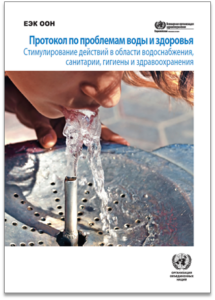Currently, the countries of Central Asia are facing a significant deficit of water resources, particularly affecting rural areas. Despite improvements in access to safe drinking water and sanitation conditions in the region’s countries over the past decades, aging infrastructure, lack of qualified personnel, and financial constraints continue to pose obstacles to achieving the United Nations’ 6th Sustainable Development Goal (SDG 6) – ‘Clean Water and Sanitation’.

For example, in Kazakhstan, in 2022, 10% of the rural population remained without regular access to water. In Uzbekistan, the proportion of the population with access to centralized water supply increased from 66.6% in 2005 to 69.6% in 2022. Meanwhile, 30.3% of people, primarily residing in rural areas, relied on alternative water sources such as wells, bottled water, rainwater, etc., while 0.1% depended on delivered water. As a result, these countries need to pay special attention to improving the management of water supply and wastewater systems, developing effective policies, and implementing measures aimed at reducing environmental impact and enhancing prevention programs related to waterborne diseases.
Sustainable water supply plays a crucial role in the public health system, especially in the context of preventing waterborne diseases, including COVID-19. Water-related diseases caused by microbiological contaminants and pathogens such as gastrointestinal infections, typhoid fever, intestinal parasites, and viral hepatitis remain a significant issue in the region. Diarrhea continues to be the leading cause of death among children under 5 years old according to the World Health Organization (WHO). Considering climate changes, the risk of water-related diseases will continue to rise.
To accelerate actions towards achieving SDG 6, Kazakhstan and Uzbekistan announced their intention to join the Protocol on Water and Health in June of this year, developed by the United Nations Economic Commission for Europe and the World Health Organization. Tajikistan has also expressed interest in the benefits of this tool. It is expected that Kazakhstan’s accession process to the Protocol will be completed by the end of 2024 with the support of the Ministry of Health, while Uzbekistan is already in the final stages of this process.
The Protocol on Water and Health provides an effective legal framework and a range of practical tools to support countries in ensuring safe water supply, sanitation, and hygiene for all, as well as combating waterborne diseases and reducing water-related morbidity and mortality. The Protocol was adopted and ratified by European Union countries in 1999 and has been successfully used by countries for over twenty years to ensure equal access to safe water supply and sanitation. Many countries from the post-Soviet space are participants in the Protocol, but none of the Central Asian countries have joined yet. It is important to note that joining the Protocol does not require joining the 1992 Water Convention on the Protection and Use of Transboundary Watercourses and International Lakes (out of Central Asian countries, only Kazakhstan, Turkmenistan, and Uzbekistan ratified the Convention).
The uniqueness of the Protocol lies in its combination of environmental protection and promotion of human health by bringing together the efforts of various sectors and professional communities, such as environmental advocates, public health specialists, hydrologists, epidemiologists, as well as experts in water supply, sanitation, and hygiene. This approach allows, firstly, to encompass the entire water cycle from water collection to wastewater reuse and, secondly, to effectively respond to water-related disease outbreaks, taking climate risks into account.
To learn more about the Protocol on Water and Health, you can visit the following link:
https://unece.org/sites/default/files/2023-05/2119502_R_ECE_MP.WH_21_WEB.pdf
For information:
The Swiss Initiative “Blue Peace Central Asia” supports cooperation among Central Asian countries in sustainable water resource management.
Within the framework of the Blue Peace CA Initiative, implemented by CAREC, a Community of Practice on Water, Sanitation, and Hygiene (CoP4WASH) was established in collaboration with the University of Northwestern Switzerland and the Tajik Office of the International Secretariat for Water in 2021.
CoP4WASH serves as a platform for collaboration between academic institutions, non-governmental organizations, and the private sector to conduct research in the field of WASH. Support from researchers, practitioners, and various stakeholders will provide a scientifically grounded basis for accepting innovations, best international practices, and decentralized water supply and sanitation technologies at the legislative level in Central Asian countries.

